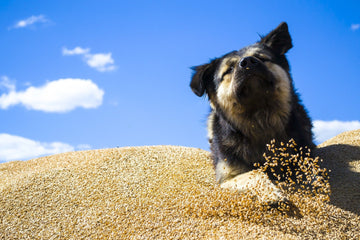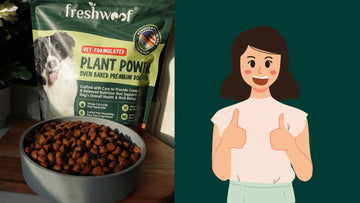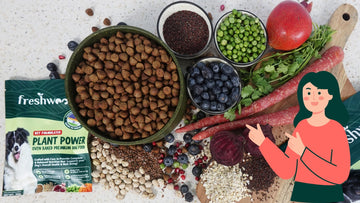A grain-free diet for dogs is getting a lot of promotion and buzz these days, But is there a benefit to feeding a grain-free diet to dogs, or this concept is limited to being a marketing gimmick? Everyone has read or seen ads about feeding your dog a grain-free diet, so where did the belief of grain-free diets come from?
In the 2000s, multiple pet professionals concluded that many dogs were suffering from allergies to corn, wheat, or soy," says Berman, vice chairman of World Pet Association, who dived into the history of grain-free diet for pets. "Few marketers who wished to get the most from this opportunity tried to seek product differentiation in the marketplace and created the term 'grain-free,' after which the widespread concern about corn and wheat extended to all grains." "Grain-free" quickly became a watchword for quality, which unfortunately gave all grains a bad reputation. And soon other companies began using this term without referring to the available scientific knowledge and data.
Although it is important to recognize, however, that very few dogs have allergies to the grains in dog foods. The vast majority of food allergies are to the protein source (meat) in the food.
So are “grain-free” diets actually a good choice for dogs?
Basically, there is actually no scientific evidence to support the claims that grain-free is better when it comes to our dogs. Grains might have gotten a very bad name and become a victim of misconceptions because of some marketers, but in reality, whole grains are a reservoir of nutrients and goodness, equipped with protein, vitamins, minerals, essential fatty acids, and fiber.
Modern-day dogs are physiologically omnivores, not obligate carnivores like some pet food companies often suggest in their advertising. While a rather small percentage of dogs experience allergies to an individual grain (mainly wheat or corn), eliminating all grains from the diet is not only unnecessary but may have adverse health effects, current research is also investigating the effects of grain-free diets on heart health. Grains are a very uncommon cause of food allergies in pets. True food allergies are fairly rare in pets and the most common ingredients reported to cause allergies are animal proteins (beef, dairy, chicken, egg, and fish). A 2016 study showed that animal-meat ingredients including beef, dairy, chicken, lamb, etc. were responsible for 236 cases of food allergies while ingredients like wheat, rice, soy, barley, etc) were involved in only 77 cases.
But shouldn’t dogs be eating like wolves?
Alongside the "grain-free" trend was the rise in the popularity of the "wolf-diet". Marketers incorporated the notion that dogs are similar to wolves and their diet should mirror the diet of wolf. Many pet-parents are also lead by the perception that dogs should be eating a diet similar to their wild ancestors. But in reality, dogs are actually different from wolves, in fact, scientists believe that one of the physiological changes that helped dogs evolve alongside humans was the ability to digest starch. Dogs have differences in 10 key genes compared to wolves that enable them to better utilize grains and other plant-based ingredients than wolves can. According to scientists, these new genetic traits allowed dogs to thrive on a diet rich in starch, much different from the diet of wild wolves. The Swedish researchers published a paper that confirmed that compared with wolves, dogs have more copies of a gene called AMY2B, crucial for producing amylase, a primary enzyme that digests starch. In dogs, amylase activity is around 30 times higher than in wolves. This study also proved that modern dogs have additional genetic changes that make them efficient carbohydrate users (SOURCE: Arendt, M., et al. “Amylase Activity Is Associated with AMY2B Copy Numbers in Dog: Implications for Dog Domestication, Diet and Diabetes.” Animal Genetics (October 2014) 45(5): 716– 722.). Thousands of years of evolution have made the nutritional needs of these two species very different.
"Unfortunately, all this information doesn’t prevent hundreds of companies from advertising their grain-free diets," Says the Clinical research team of Cummings Veterinary Medical Center at tufts.
The bottom line is that “grain-free” is a marketing concept designed to sell pet food, not a health solution to help your fur-baby live a long, healthy life. Always look for dog food that guarantees to be nutritionally complete and balanced for a particular life stage. When choosing a diet whether plant-based or meat-based, look for the Association of American Feed Control Official (AAFCO) statement on the packaging that tells that the diet is nutritionally complete and balanced. Rest assured that dogs can indeed digest grains very well and reap all their benefits effectively. Like humans, dogs can successfully thrive on a varied diet until they get all of the core nutrients required by the body, including plant-based foods. Our dogs rely on us for their life decisions, it is always better to do your research, talk to open-minded vets and nutritionists and choose the diet for your dog with the least possible drawbacks or no drawbacks at all!
Freshwoof meals are 100% plant-based and follow the American and European nutritional guidelines, i.e contains all the essential nutrients your dog needs from protein & essential amino acids to a wide variety of vitamins & minerals, essential fatty acids, fiber, and naturally occurring antioxidants, moreover, are better for the planet and other animals too.
Happy Feeding!





